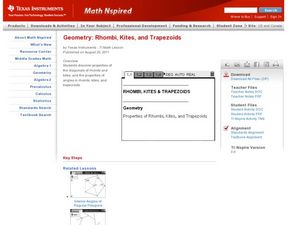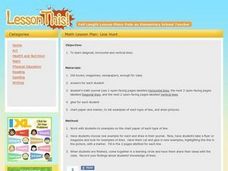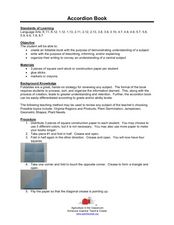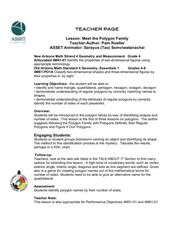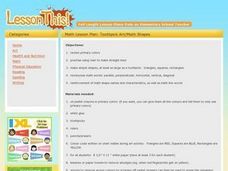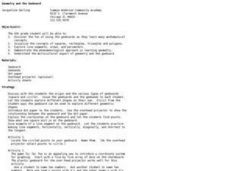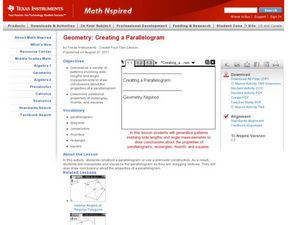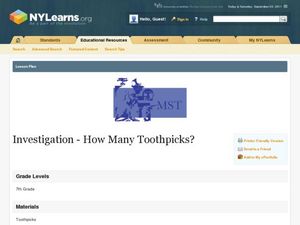Centre for Innovation in Mamatics Teaching
Area, Perimeter and Volume
Develop young mathematicians' knowledge of two- and three-dimensional shapes with this geometry workbook. From learning about the classifications of different shapes and figures to calculating their area, perimeter, and volume, this...
Curated OER
Diagonals of Quadrilaterals
Teach your mathematicians how to identify different polygons based on their diagonals. Relating quadrilaterals to the different number of diagonals formed, students use the TI to create a visual of their shape.
Houghton Mifflin Harcourt
Unit 6 Math Vocabulary Cards (Grade 5)
Acute angles, nets, and vertices are only a few terms that a set of flash cards includes. Among the 108 cards, two types are available; word cards printed in bold-faced lettering, and corresponding definition cards equipped with an...
Houghton Mifflin Harcourt
Unit 5 Math Vocabulary Cards (Grade 6)
Acute angle, line of symmetry, and vertex are a few terms you'll find in a set of 90 flashcards designed to reinforce math vocabulary. Included in the set are two types of cards; a word card printed in bold font, and a...
Curated OER
Alice in Wonderland
Students explore the contrasting movement characteristics of Alice, the White Rabbit and the Queen of Hearts. In a circle students follow the teacher who introduces movement for the characters of the Alice, the White Rabbit and the Queen...
Lincoln Public Schools
Developmental Strokes: Pre-Writing Worksheet
Young writers develop their fine motor skills one stroke at a time with this simple tracing worksheet. Looking at pictures of eight basic figures ranging from horizontal and vertical lines to circles and triangles, children practice...
Curated OER
Diagonals of Quadrilaterals
Pupils find the diagonals of the quadrilaterals. In this geometry lesson, students identify and use properties of quadrilaterals. They define different parts of a quadrilateral shape.
Curated OER
Diagonals to Quadrilaterals II
Learners identify the properties of different polygons. In this geometry lesson plan, students find the slope of a line and calculate the distance between two lines. They differentiate between similar and congruent polygons.
Curated OER
Rhombi, Kites, and Trapezoids
Young scholars identify the number of diagonals for each polygon. In this geometry lesson plan, students identify the polygons based on their diagonals and the way it intersect. They create visuals using the navigator to see the changes...
Curated OER
Line Hunt
Students identify lines in everyday images. In this art analysis lesson, students practice drawing diagonal, vertical and horizontal lines on pieces of chart paper. Students examine a page from a magazine and identify the...
Curated OER
Accordion Book
Learners make an accordion book to show information that is associated with a particular learning event. In this accordion book instructional activity, students follow paper-folding directions to make the book. They fill the book with...
Curated OER
Cutting Sandwiches
Learners discuss shapes and their characteristics. As a class, they explore shapes made from a square. Students explore triangles, squares, fractions of a square such as a half and a quarter. Individually, they complete worksheets, and...
Curated OER
Meet the Polygon Family
Fourth graders investigate regular polygons. In this regular polygon lesson, 4th graders explore the attributes of different polygons. Students work in groups to complete a KWL chart regarding polygons.
Curated OER
Toothpick Art
Young scholars review primary colors and practice making straight lines. For this visual arts lesson, students paint simple shapes as large as a toothpick, using specific primary colors. During the construction of the shapes young...
Curated OER
Platonic Solids
Students identify different types of polygons. In this geometry lesson, students differentiate between convex and regular shapes. they identify the names of two and three-dimensional objects.
Curated OER
Quadrilateral Bunny
Students identify the properties representing quadrilateral. In this geometry lesson plan, students differentiate between special and regular quadrilaterals. They discuss and demonstrate hierarchy of quadrilaterals.
Curated OER
Polly and the Shapeshifter
Students analyze the patterns in polygons and relate it to the rate of change. In this algebra lesson, students discuss the relationship between the data and the graph of the data.
Raytheon
Understanding Triangles
In this understanding triangles worksheet, students read 6 pages of examples and explanations about identifying triangles, determining length of sides and degrees of angles, including the hypotenuse, then answer 28 questions, answers...
Curated OER
Geometry and Geoboard
Sixth graders use geoboards and dot paper to experiment with geometric concepts. In this geometry instructional activity, 6th graders complete four activities using geoboards or dot paper including naming points on a coordinate plan and...
Curated OER
Creating Parallelogram
Learning how to define vocabulary words related to solving parallelograms will assist your learners in identifying different parallelograms. They use the navigator to view different shapes created by moving the parallelogram around.
Math Mammoth
Geometry Problems
In this math activity, middle schoolers find the area of the triangles, the perimeter of the irregular shape, and the diagonal of the cube.
Curated OER
How Many Toothpicks?
Students investigate different geometric patterns. In this geometry lesson, students create different shapes using toothpicks. They create different patterns and designs and complete a charts using different measurements.
Curated OER
Let's Learn About Fire Safety!
In this firs safety lesson, students read Clifford , a Firehouse Dog, discuss safety rules and tips as a class, and create illustrations for the rules they generate.
Curated OER
Properties of Special Parallelograms
Students identify properties of trapezoids. In this geometry lesson, students are put into groups and use computer programs to analyze polygons. They drag and move the shapes around as they make predictions.










